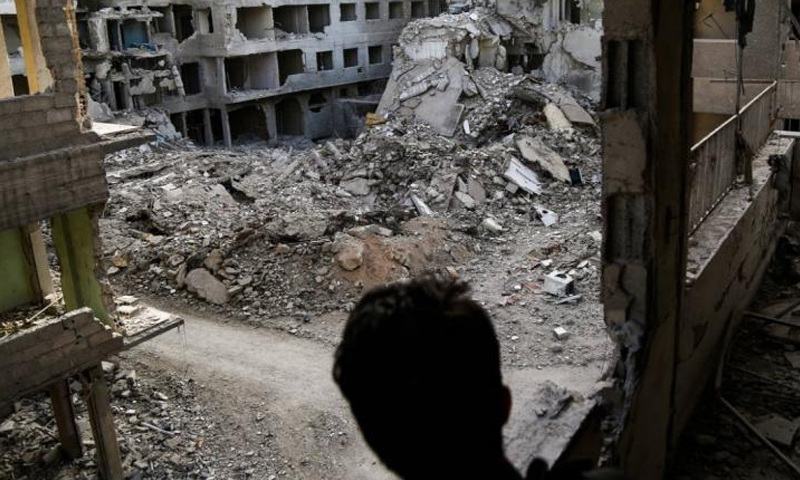



Vyacheslav Sytnik, the Deputy Head of the Russian Reconciliation Center for Syria, officially known as the Centre for Reconciliation of Opposing Sides and Refugee Migration Monitoring in the Syrian Arab Republic, has announced that reconstruction projects in Syria are under study for the repatriation of Syrian refugees.
The Reconciliation Center is working with the Syrian Ministry of Local Administration and Environment to rehabilitate Syria’s infrastructure, Sytnik said in a joint Syrian-Russian press conference held on 28 January in the Syrian capital Damascus.
The rehabilitation projects will prioritize the restoration of residential houses, schools, medical establishments, water pumping plants, electrical facilities, and food-industry facilities, Sytnik added.
The Russian official noted that such projects would contribute to the return of Syrian refugees to their areas of residence.
On 11 and 12 November 2020, the regime’s government kicked off a two-day Russia-backed conference in Damascus towards facilitating Syrian refugees’ return to their country. Russia pledged in the conference to allocate 1 billion USD for reconstruction in Syria.
“Russia will allocate 1 billion USD for the restoration of electricity networks, industrial infrastructure, and other humanitarian projects in Syria,” Russian news agency Sputnik cited Mikhail Mizintsev, the head of the Russian-Syrian Interministerial Coordination Center for the Return of Syrian Refugees.
The cost of reconstruction in Syria was estimated by the United Nations (UN) on 9 August 2018 to be close to 400 billion USD, according to a report of a meeting by the UN’s Economic and Social Commission for West Asia (ESCWA).
ESCWA said the “volume of destruction in physical capital and its sectoral distribution had been estimated at more than 388 billion USD. This figure does not include the human losses resulting from deaths or the loss of human competences and skilled labor due to displacement, which were considered the most important enablers of the Syrian economy.”
On the sidelines of the refugee return conference, Russia signed with the Syrian Ministry of Public Works and Housing a memorandum of understanding to “enhance cooperation and exchange information, experiences and research results on the tasks and possibilities of both parties in matters of public works and housing.”
The Russian side stated that the agreement will come into force as of the date it is signed. Since the beginning of its works, the Russian-Syrian Interministerial Coordination Center for the Return of Refugees has held 31 joint meetings on refugee returns and reconstruction issues.
The European Union (EU) had declared its refusal to attend the conference on the return of Syrian refugees, considering it “premature.”
While the decision to return must always be an individual one, conditions inside Syria at present do not lend themselves to the promotion of large-scale voluntary return, in conditions of safety and dignity in line with international law, the EU stated.
For its part, Canada also refused to attend the conference. The Canada and Syria Twitter account, affiliated with the Canadian government, said that Canada would not attend the conference on the return of Syrian refugees hosted by Russia and Syria in Damascus.
The account said that Canada supports a safe and voluntary return for refugees; however, these conditions are not met in Syria.
if you think the article contain wrong information or you have additional details Send Correction